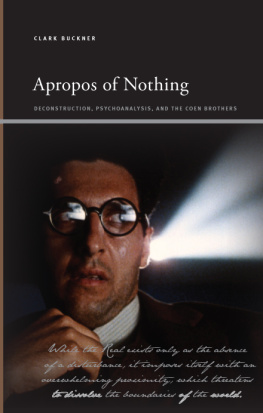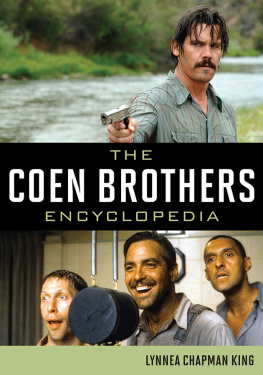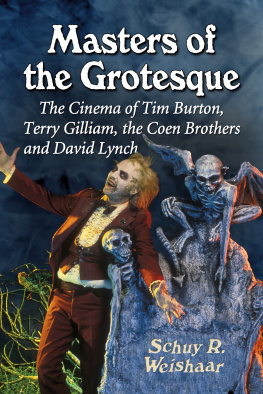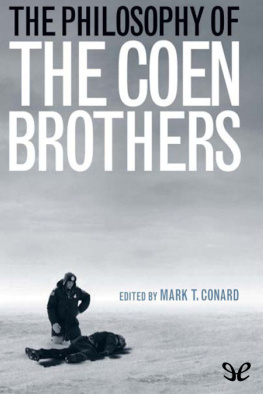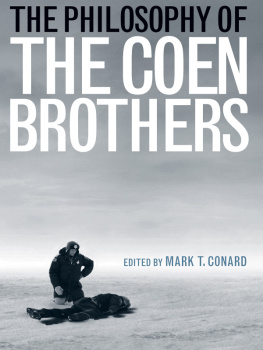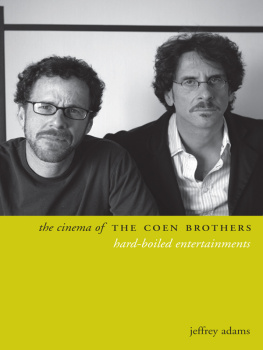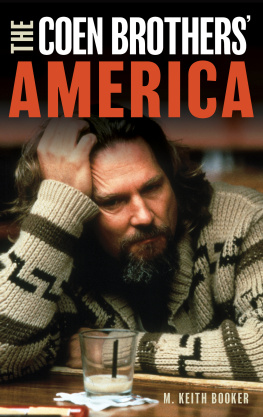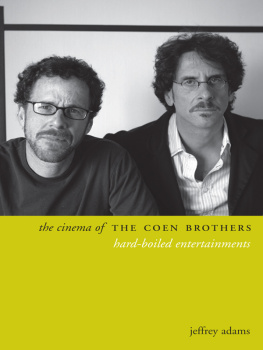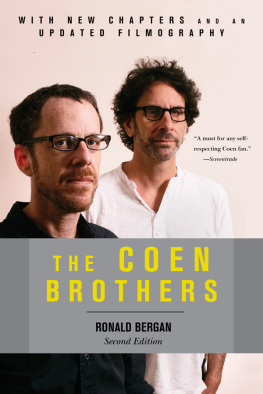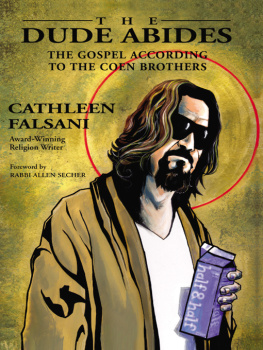SUNY series, Insinuations: Philosophy, Psychoanalysis, Literature
Charles Shepherdson, editor
Apropos of Nothing
Apropos of Nothing
Deconstruction, Psychoanalysis, and the Coen Brothers
CLARK BUCKNER
Published by State University of New York Press, Albany
2014 State University of New York
All rights reserved
Printed in the United States of America
No part of this book may be used or reproduced in any manner whatsoever without written permission. No part of this book may be stored in a retrieval system or transmitted in any form or by any means including electronic, electrostatic, magnetic tape, mechanical, photocopying, recording, or otherwise without the prior permission in writing of the publisher.
For information, contact State University of New York Press, Albany, NY
www.sunypress.edu
Production by Jenn Bennett
Marketing by Fran Keneston
Library of Congress Cataloging-in-Publication Data
Buckner, Clark, 1968
Apropos of nothing : deconstruction, psychoanalysis, and the Coen Brothers / Clark Buckner.
pages cm. (SUNY series, insinuations: philosophy, psychoanalysis, literature)
Includes bibliographical references and index.
ISBN 978-1-4384-5255-5 (hardcover : alk. paper)
E-ISBN 978-1-4384-5256-2 (ebook)
1. Coen, JoelCriticism and interpretation. 2. Coen, EthanCriticism and interpretation. I. Title.
| PN1998.3.C6635B833 2014 |
| 791.4302'330922dc23 | 2013033745 |
10 9 8 7 6 5 4 3 2 1
To
Jules and Elias
Look upon me, Ill show you the life of the mind!
Charlie Meadows, aka Karl Madman Mundt
Contents
Acknowledgments
Among its many challenges and satisfactions, writing this book largely was a solitary process, in which I engaged people almost exclusively through their articles, books, and movies. At the same time, however, I depended upon a handful of others whose patient support and critical acumen were instrumental in bringing the book to fruition. First among them, Kalliopi Nikolopoulou and Jason Winfree gave me the opportunity to begin the project as a paper on the Coen Brothers film Fargo for their panel on Deserts at the annual meeting of the American Comparative Literature Association. Here and elsewhere, my work has benefited significantly from their consistent support and thoughtful criticism. The other books in this series set a high standard for my own writing, and I am grateful to the series editor, Charles Shepherdson, for his generous encouragement of my efforts. The readers who reviewed my manuscript for State University of New York Press provided insightful feedback on the project, and my subsequent exchanges with Todd McGowan were particularly helpful to its further refinement. Also at State University of New York Press, I am grateful to Andrew Kenyon and Jenn Bennett, who patiently endured my meticulous revisions as they oversaw the books publication. Among philosophers, Gregg Horowitz, David Hoy, and David Wood have long mentored my intellectual development, and this project bears the marks of their continuing impact on my thinking. Exchanges with the psychoanalysts Raoul Moncayo and Dany Nobus stimulated my writing. Anton Malko offered helpful feedback on my prose. And, over countless dinners, my good buddy Sebastian Lurie provided a sounding board for my ideas, despite the fact that he disagrees with me almost categorically. Above all, I am grateful to my wife and dear friend Jennifer Perfilio, who makes a home in her grace for the intolerable cruelty of my love. This book is dedicated to our sons.
Introduction
Apropos of Nothing
Or, What Does It Mean to Be Blood Simple?
Blood Simplicity
A blank, white screen opens the Coen Brothers film Fargo , slowly to reveal a landscape as a car emerges from the distance, first only as an obscure interruption of this oversaturated image, and crosses the screen on a wind-and snow-blown road. This bleak expanse of the films locationFargo, as the middle of nowherehelps to articulate the absence that permeates the film and ties together several of its key elements. Oblivious to the consequences of his actions, the villain Jerry Lundergaard (William Macey) arranges to have his own wife kidnapped. To him, it seems, the kidnapping is merely a business strategy: a clever scheme to pilfer money from his father-in-law. He has no apparent appreciation of the traumatic violence entailed in the kidnapping, not only for his beloved but also for their son. Its real sound, he promises the kidnappers, its all worked out. While his crime undoubtedly is eccentric, the Pollyanna reassurance with which he disavows it is altogether consistent with the empty prattle that pervades his social milieu. The characters in the film speak with absurdly bright, Midwestern accents, using corny upbeat clichs with vapid, homespun enthusiasm: Aw, geez. You betcha! Dont cha know? When it erupts, the films violence too is brutally meaningless. With Jerrys wife face down dead in the snow beside him, her kidnapper and killer stands silently beside a frozen lake, wearing his long johns, boots, and a goofy-looking hat, feeding his partners body parts into a wood-chipper. Theres no lesson to be learned, no catharsis. Its not even tragic: its pathetic, ridiculous even.
In this regard, Fargo is emblematic of the Coens work. Absence is so central to their films that, one might say, they are about nothing . The Big Lebowski features a Dude (Jeff Bridges) who does nothing. It revolves around a kidnapping that has not in fact taken place, and the ransom is paid to a spastic gang of nihilists with the ringer for a ringer. Norville Barnes (Tim Robbins), the protagonist in The Hudsucker Proxy , is an innocentan idiot reallywhos installed as the president of a major corporation in order to depreciate the value of the companys stock. Throughout the film, he draws empty circles, zeros, and enthusiastically proclaims, You know, for the kids! In The Man Who Wasnt There , the eponymous protagonist, Ed Crane (Billy Bob Thornton) is the shadow of a man, a ghost, as he describes himself, who remains virtually silent throughout most of the story. Burn After Reading features a conspiracy surrounding an utterly worthless computer disc. Intolerable Cruelty hinges on divorce proceedings that leave one spouse with absolutely nothing. In No Country for Old Men , Sheriff Bell (Tommy Lee Jones) bemoans the loss of collective values in the modern world, while the psychopathic assassin Anton Chigurh (Javier Bardem) uses a slaughterhouse bolt gun to blow holes in his victims skulls. And Barton Fink is a film that revolves around the absence of a film, or more specifically, the absence of a screenplay.
The figures of absence that permeate the Coens films are correlates of the irrationality that drives their characters, sustains their plots, and gives the slip in the slapstick of their black comedy. As New Yorker film critic David Denby notes, with specific regard to their 1985 breakthrough film, Blood Simple , What interests the Coens is how foolishly people behave, and how little they understand of what they are doing (Denby, 2008; 74). In Blood Simple , they capture this sense of the irrationaland establish its continuing importance for the subsequent development of their oeuvrein the central image from the films final sequence. death, he realizes, will be the result of a stupid misunderstanding. If I see him (presumably in Hell), he declares, Ill give him the message.

